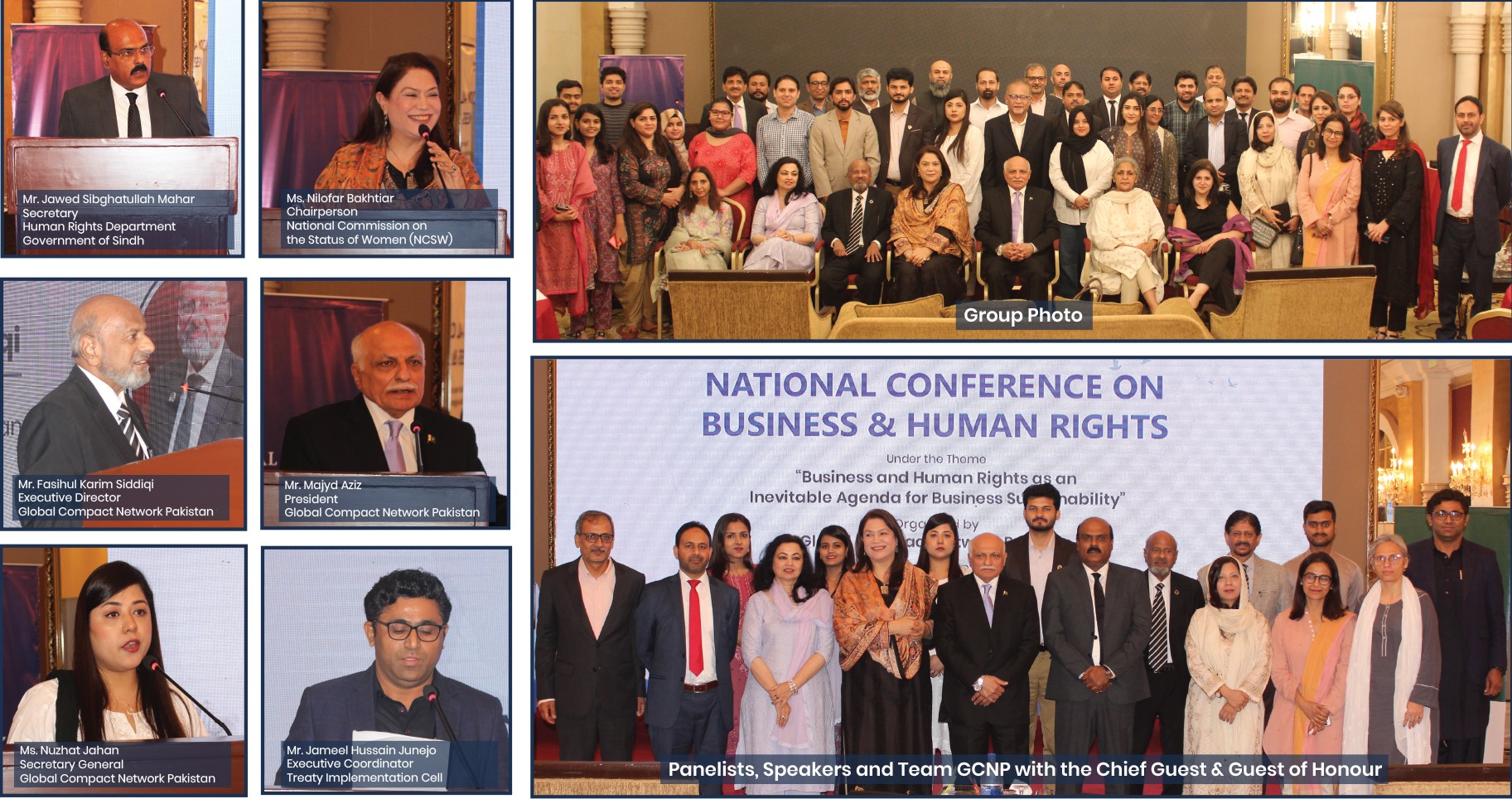National Conference on Business & Human Rights

Tripartite stakeholders must protect human rights — Nilofar Bakhtiar
“The Protect, Respect and Remedy Framework provided by the UN Guiding Principles outlines a roadmap as to how the State should protect human rights in the context of business activity. These principles obligate the stakeholders including the government employers and workers to meet the international obligations under the core UN Human Right treatise and core ILO Conventions to which Pakistan is party.” Ms. Nilofar Bakhtiar, Chairperson National Commission on the Status of Women, highlighted this as Chief Guest of National Conference on Business and Human Rights organized by UN Global Compact Network Pakistan and Employers Federation of Pakistan in Karachi.
Ms. Bakhtiar added that “The National Action Plan on Business and Human Rights formulated by the Government of Pakistan has proposed a number of actions aimed to review the framework, engage with, and build the capacity of National Human Right Institutions to promote and sustain effective support in which, among others, significant gender disparity is addressed and existing laws pertaining to all forms of violence against women and girls are reviewed in order to protect the rights of women at work.” She further said that “National Commission on the Status of Women has been assigned, in the National Action Plan, the challenging task of conducting national study to determine the sectors in which significant gender disparity is prevalent and utilize the findings of the study to asses and develop a policy regarding the mandatory reservation of Quotas for women in different sectors.”
Mr. Jawed Sibghatullah Mahar, Secretary Human Rights Department, Government of Sindh, who was the Guest of Honor, in his speech disclosed that a “Draft Provincial Action Plan on Business and Human Rights has been formulated by the Human Rights Department of Government of Sindh. Actions stipulated by the Provincial Action plan include a survey mapping exercise for the number of Industries, SMEs in supply and value chain for the export-oriented goods, conducting human rights impact assessment in the value chain of exports industry, review and updating of existing labor laws to bring them in line with ILO Conventions and creating awareness, capacity building and institutional development. The Action Plan also stipulates establishing and strengthening district level mechanisms besides emphasizing upon corporate responsibility to respect human rights in areas such as occupational health and safety, women and child protection, etc.”
Mr. Majyd Aziz, President UN-GCNP, in his welcome address stated that, “Human Rights refer to basic rights and freedoms that everyone is entitled to as a human being. Human Rights range from general rights, such as the right to life, to more specific rights necessary to live a respectful and worthy life, such as rights to education, work, health, or food. There is an imperative need to consider Human Rights from a holistic perspective rather that the old traditional thinking of violation of Human Rights.” He further said that, “not only the vulnerable and downtrodden have their Human Rights violated or denied, but even the rights of many in the private sector are violated.” He added that corruption and bad governance by government functionaries even for genuine work are vivid examples. He also said that the private sector is playing a leading role in Corporate Social Responsibility and Human Rights compliance even in areas that are the domain of the state but who has abdicated its responsibilities.
The Executive Directive of GCNP, Mr. Fasihul Karim Siddiqi urged the businesses to respect the businesses and human rights in order to gain competitive advantage in the global market. “The more the business respects human rights in all dimensions of its activities, the more the business is likely to be sustainable”, he added. The Löning Country Risk Register rates Pakistan as one of the high risk countries in terms of Business and human rights compliance. Embracing the 10 core labour standards relating to child labour, forced labour, freedom of association and collective bargaining, improved working conditions and wages, discrimination in employment and education, health and safety are some of the areas organisations need to take concrete actions to mitigate risks related to abuse of human rights, he further added.
There were two intensive Panel Discussions, moderated by Ms. Nuzhat Jahan, Secretary General GCNP and Mr. Fawad Zahir, Program Manager GCNP, on the subjects of “Business and Human Rights –an inevitable agenda for business sustainability” and “Challenges in addressing Human Rights issues and the role of private sector in promoting Business and Human Rights.” The panelists were Ms. Shaiyanne Malik, President Women Chamber of Commerce, Ms. Kiran Zubair, CEO Theori Y, Ms. Arshia Ahmed Saqib, Vice President Talent & Culture Engro Corporation Limited, Mr. Itfaq Khaliq Khan, Programme Lead Sightsavers (UK), Mr. Zulfiqar Shah, Member Sindh Human Rights Commission, Ms. Zehra Akbar Khan, General Secretary Home Based Workers Federation, Ms. Zeenia Shaukat, Director The Knowledge Forum and Dr. Mustaghis ur Rehman, Associate Dean and Principal Bahria Business School.
The Conference participants also unanimously adopted the Declaration of Business and Human Rights Policy for Business Enterprises in Pakistan. This Declaration stipulates that the business enterprises in Pakistan commit themselves to ADOPT an explicit and public policy commitment to meet their responsibility to respect human rights. In so doing, they commit themselves to shape their business practices in line with the UN Guiding Principles to prevent, address and remedy human rights abuses committed in business operations and their supply chain within their sphere of influence. The enterprises further commit to Set up internal accountability mechanisms for the implementation of human rights policies within their enterprises and their supply chain and integrate them into their recruitment, procurement and other management policies.
============================================
Presented for favorable publication/distribution in/by your esteemed Newspaper/News Agency
Nuzhat Jahan
Secretary General UN-GCNP
